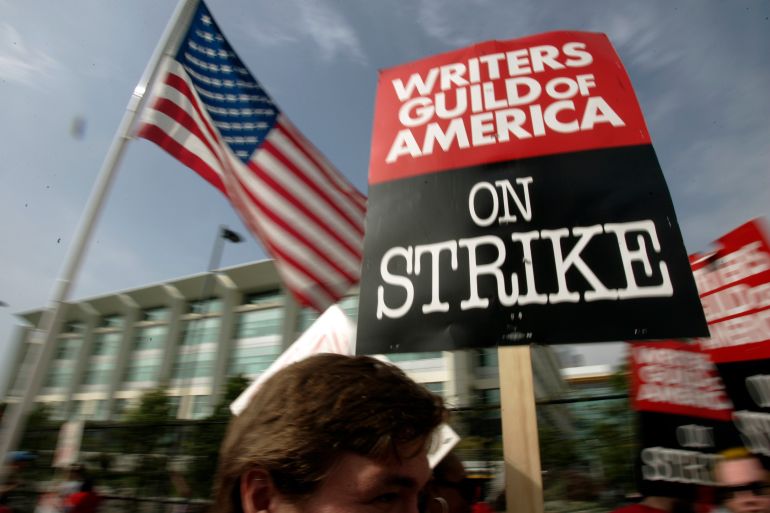Warner Bros Discovery warns Hollywood strikes may impact film slate
Some features and dramas Warner Bros Discovery is well known for are on ice for now with no end in sight to the strike.

Warner Bros Discovery has warned that uncertainty over the dual strikes by Hollywood writers and actors could impact the timing of its film slate and its ability to produce and deliver content.
The studio said on Thursday that it anticipates members of the Writers Guild of America and the Screen Actors Guild (SAG) would return to work in early September – a prediction that sources say is optimistic, given the angry tenor of remarks from the picket lines.
Keep reading
list of 4 itemsUS urges nations to tell Russia to stop using grain as ‘blackmail’
Photos: Trump pleads not guilty in Washington, DC, to 2020 election charges
Donald Trump pleads not guilty to 2020 election charges
“We are in some uncharted waters,” CEO David Zaslav told investors, adding, “We all got to fight to get this resolved.”
The strikes have disrupted the production of scripted series for the fall TV season and halted work on films as workers battle over pay in the streaming era. SAG actors are prevented from promoting upcoming films, which could imperil the timing of fall releases. Toymaker Hasbro also flagged a hit from the strike on Thursday.
The Alliance of Motion Picture and Television Producers, which represents Warner Bros Discovery and the other major studios in negotiations, asked to meet on Friday with the writers’ guild to discuss the possibility of resuming talks. The writers have been on strike since May 2.
Meanwhile, SAG-AFTRA President Fran Drescher appeared on Thursday at picket lines in New York, to rally members of the guild who walked off the job on July 14.
In remarks outside Paramount Global’s offices near Times Square, which were recorded by Variety, she said, “I promise you that we are not going to compromise. This is a seminal deal, and there is no turning back.”
Revenues hit
Warner Bros Discovery’s revenue took a hit in the second quarter due to soft box office results, including the underperformance of the DC Comics-inspired film, The Flash. Studio revenue came in at $2.58bn, far below estimates of $3.21bn, according to Visible Alpha.
The company also incurred marketing costs for its Barbie film, which it released to huge box office success in July.
“Although the company is riding a pink wave of success from Barbie’s theatrical run, other features and the dramas Warner Bros Discovery is so well known for are on ice until negotiations pick back up,” Third Bridge analyst Jamie Lumley said.
Shares of the company, forged by the union of WarnerMedia and Discovery Inc, closed up 2.7 percent on Thursday at $12.89 a share, having risen by nearly a third so far in 2023.
Overall, second-quarter revenue came in at $10.36bn, missing estimates of $10.44bn, according to Refinitiv data.
The direct-to-consumer unit posted revenue of $2.73bn, beating estimates of $2.48bn. It lost 1.8 million subscribers, more than estimates of 1.1 million by Visible Alpha.
Total global subscribers for its HBO, Max and Discovery+ services stood at 95.8 million at the end of the quarter.
Under Zaslav, Warner Bros Discovery has been seeking to run its direct-to-consumer business more efficiently. The CEO said on Thursday that the streaming business is “tracking well ahead of our financial projections”, generating positive core earnings in the first half of 2023.
Company executives said on a post-earnings call that they were confident the company will achieve $4bn in total synergies much sooner than previously thought.
They said they see a “clear path” to the company achieving $5bn or more in total synergies through 2024 and beyond.
The company cut expenses by 16 percent in the quarter, helping reduce its net loss to $1.24bn from a loss of $3.42bn a year earlier.
Free cash flow came in at $1.72bn in the three months ended June, beating estimates of $987m. The company expects full-year free cash flow in the range of $4.5bn to $5bn.